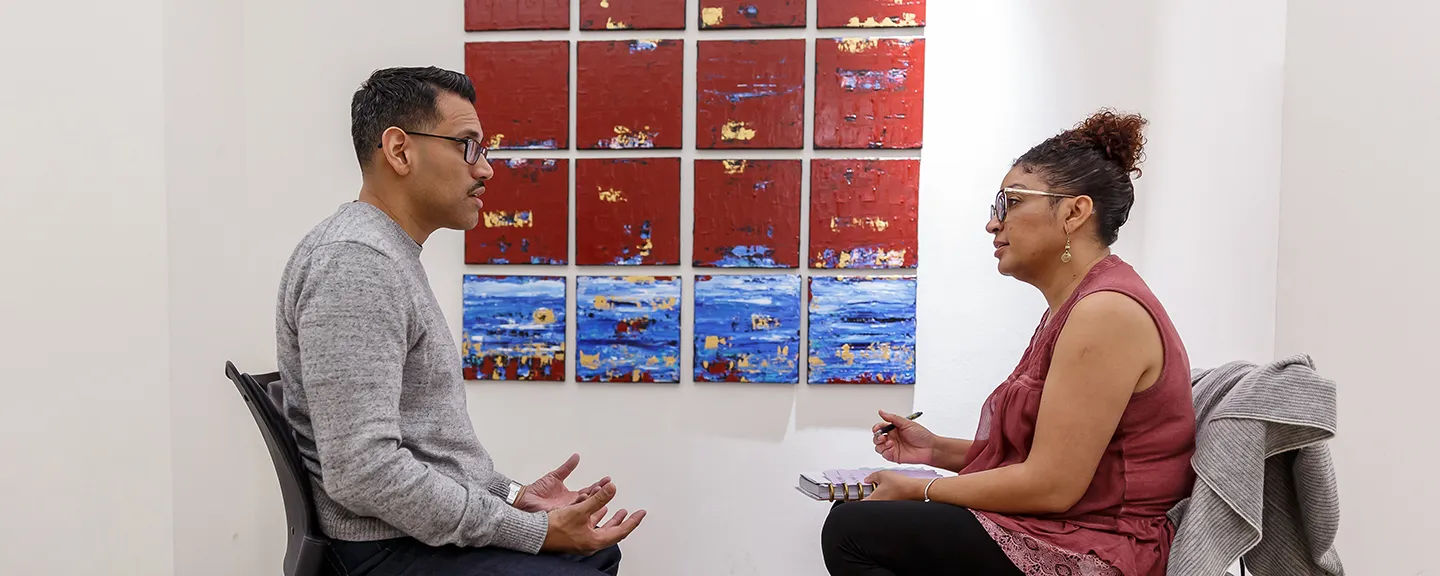- Home
- >
- APU Articles
- >
- News Article
Meet the Accomplished Artist at the Helm of APU’s MFA Program
February 13, 2019 | Written By Alyssa Burlingame

Even as a young child, Lemus was creatively gifted, spending much of his time pouring over his art. His teachers took note of his artistic abilities and sought him out for classroom projects. Lemus would go on to earn his BFA from the Art Center College of Design and his MFA from the California Institute of the Arts. His work has been showcased in galleries across North America in both solo and group exhibitions.
Now, in his latest role as director of Azusa Pacific University’s Master of Fine Arts (MFA) in Visual Art program, Lemus has the opportunity to shape the future for students in the program and launch the art degree into its next phase. “I’m thrilled to be able to build on my own experiences and challenges as an artist to guide our students and help this program continue to grow,” Lemus said. “Creating new opportunities for students and graduates with major art institutions and expanding the profile of the MFA are important areas of focus for me in moving this program forward.” Recently, the program began offering three start dates throughout the year in the spring, summer, and fall to offer increased flexibility to graduate art students pursuing their MFA.
Meet the Faculty: Nery Gabriel Lemus, MFA
As an artist and professor, Lemus frequently reminds others that creativity is not exclusive to artists. In fact, he believes creativity in its diverse forms is built into all people as image bearers of God, the ultimate Creator. “Creativity is not limited to a select few,” he said. “Creativity is something that is innate in each of us as a gift from God.” And, in many career fields, creative skills are more desirable than ever Lemus noted, as organizations increasingly produce visual imagery and creative content in different mediums.
For the serious artist pursuing a Master of Fine Arts, the program is a training ground for the habits they will apply throughout their artistic careers, whether they become full-time working artists, art teachers, or community arts organizers or take on another role. It’s also a time to explore and establish their voice as an artist. “Art is incredibly personal for the artist—the work they do must come from somewhere within themselves, and it must be authentic,” Lemus said. “A lot of times when I’m meeting with my students, it becomes very personal because they start talking about their own experiences and it almost becomes like a therapy session.”
Lemus is uniquely equipped for these moments as a result of his work as a Therapeutic Behavioral Specialist for over 14 years. Often working on cases involving family trauma, child abuse, racism, or division among communities, Lemus addressed these issues first in his professional capacity in social work and then through his art making. “It was such an immediate connection,” he said. “Things I would be dealing with on the job would work their way into my private art practice.”
When students feel challenged by the rigor of their program—the MFA is widely recognized as the primary terminal degree for practitioners of the fine arts—Lemus encourages them to dig in to the growth and opportunities that come from any difficult but worthy endeavor. “Artists spend a lot of time in isolation creating their work and then putting it out there for people to judge and experience it,” he said. “It can bring up insecurities and doubt, but developing artists should trust the process and themselves.”
“I also remind our students about the importance of our faith to the production of art,” he said. “We create, because we, too, were created. Our individual artistic expressions flow from the people God made us to be.”
Nery Lemus’ Advice for MFA Students
- Work—even when you don’t feel like working.
- Challenge yourself to explore and grow as an artist.
- Trust yourself and your mentors.
- Don’t be discouraged by negative ideas others may have about your work.
- Take full advantage of your faculty and visiting artists. Learn from their experience and wisdom.
- Build community. Your peers will be your support system during and after your program.